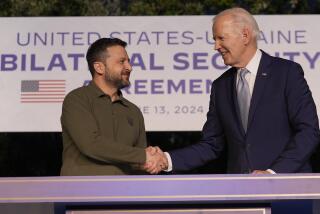Russia Gets Estonian Pledge, Will Pull Troops on Schedule
- Share via
MOSCOW — President Boris N. Yeltsin agreed Tuesday to withdraw Russian troops on schedule from the tiny Baltic country of Estonia in exchange for Estonian guarantees of fair treatment for its retired Russian army officers.
The agreement, which Yeltsin said was reached with “much difficulty,” appeared to defuse a growing dispute that had overshadowed the recent Group of Seven summit in Naples, Italy, and threatened to damage U.S.-Russian relations.
“I think that this day is a turning point in the relations between Estonia and, in more general terms, the Baltic states and the Russian Federation,” Estonian President Lennart Meri told reporters after a meeting with Yeltsin that apparently lasted at least three hours longer than scheduled.
The last 2,000 or so Russian troops, remnants of the Soviet Union’s occupation of the Baltic states, were scheduled to leave Estonia by the end of August.
But on July 10, speaking after the Naples meeting with leaders of the world’s seven richest industrial nations, Yeltsin suddenly balked, saying he would not guarantee the troops would leave on time because of “very crude human rights violations” in Estonia.
He was referring to Estonian citizenship and pension laws that Russia says discriminate against residents who are not ethnic Estonians. Those laws, and others like them in several former Soviet republics, are especially sore points for Kremlin leaders concerned about the 25 million Russians who ended up living “abroad,” outside Russia, when the Soviet Union collapsed.
In response to Yeltsin’s foot-dragging, the U.S. Senate voted July 13 to suspend most aid to Russia unless it stuck to its withdrawal deadline or reached another agreement with Estonia.
Forty-four members of the House of Representatives also sent a letter of protest to Yeltsin on Friday, saying in part, “No nation has the right to station troops on the territory of another without that country’s explicit approval, and Russia has no right to set conditions for the removal of its troops from the sovereign republic of Estonia.”
The U.S. lawmakers’ moves prompted a rush of outrage from Russian diplomats and lawmakers at what they saw as U.S. meddling in Russian affairs.
Foreign Minister Andrei V. Kozyrev categorically rejected linking economic aid to Russia with troop withdrawal from Estonia.
Tuesday’s agreement promised to lay the withdrawal issue to rest. The Itar-Tass news agency made the Russian-Estonian quid pro quo quite clear.
“The Russian and Estonian presidents signed an agreement saying the rights of Russian military pensioners should be respected equally with those of Estonian citizens,” Itar-Tass said, “as well as an accord under which Russian troops are to be withdrawn from Estonian territory by Aug. 31, 1994.”
The “military pensioners” referred to are about 9,000 retired Soviet army officers who Estonians worry would probably support Moscow rather than Tallinn in case of a conflict.
The agreement contains a clause allowing the Estonian government to deny citizenship to an officer who threatens national security--such as a longtime military intelligence officer--but procedures appear to guarantee that such a case would be an exception rather than the rule.
Particulars aside, the pensioner issue was only the latest in a series of Russian-Baltic conflicts over the treatment of the hundreds of thousands of Russians, Ukrainians and other Slavs who settled in the region while it was under Soviet rule. Several troop withdrawal deadlines have been missed as Moscow used the delays as leverage in the dispute.
Estonia, however, hotly denies any human rights violations, saying that its citizenship and pension rules conform to world practices.
More to Read
Sign up for Essential California
The most important California stories and recommendations in your inbox every morning.
You may occasionally receive promotional content from the Los Angeles Times.













